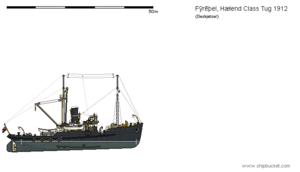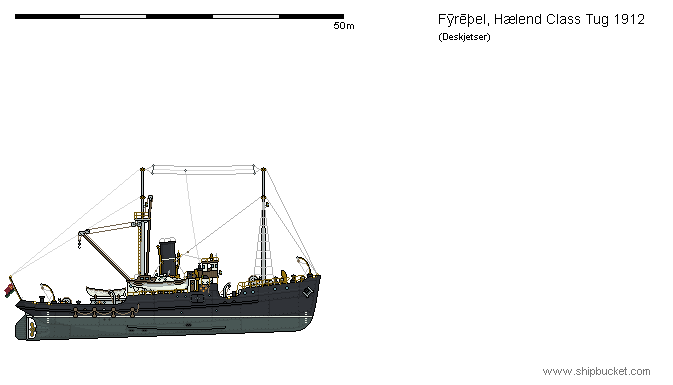Hælend Class Salvage Tug
 2px = 1ft
| |
| Class overview | |
|---|---|
| Builders: | Heard Shipwrights |
| Operators: | Fȳrish Navy |
| Built: | 1912-1914 |
| In service: | 1912-1952 |
| Completed: | 4 |
| Retired: | 4 |
| Scrapped: | 4 |
| General characteristics | |
| Type: | Salvage Tug |
| Tonnage: | 400 t |
| Length: | 153 ft |
| Beam: | 27.5 ft |
| Height: | 74.5 ft (WL-Mast) |
| Draft: | 12 ft |
| Installed power: | 1500 ihp |
| Propulsion: | 3-Cylinder Triple-Expansion Reciprocating Steam Engine |
| Speed: | 16 knots |
| Capacity: | 14 t bollard pull |
| Crew: | 12-24 |
The Hælend class of salvage tugs are the result of the previous decades rapid expansion of the Fȳrish Navy, which had been increasingly constructing new warships of ever ballooning displacement; This left a lack luster capability for naval salvage, or even just general maneuvering in and around port, which needed to be answered with a new series of powerful salvage tugboats.
In the spring of 1911 a call was put out by the Fȳrish Navy for such a series of vessels, with specifications detailing the requirements to be met, to which Heard-Scipwyrhtan[1] (Hereafter: HSI) was first to submit its design proposal on the 25th of June. Without delay, and with the proposal meeting requirements, HSI was awarded the contract before even so much as a response was heard from other companies.
The first of the class, Hælend, was laid down at HSI's Fæstēah[2] slipways on the 30th of June 1911. It was launched on the 4th of February 1912, behind schedule due to machinery lead time complications, and handed to the Fȳrish Navy on the 28th of February.
